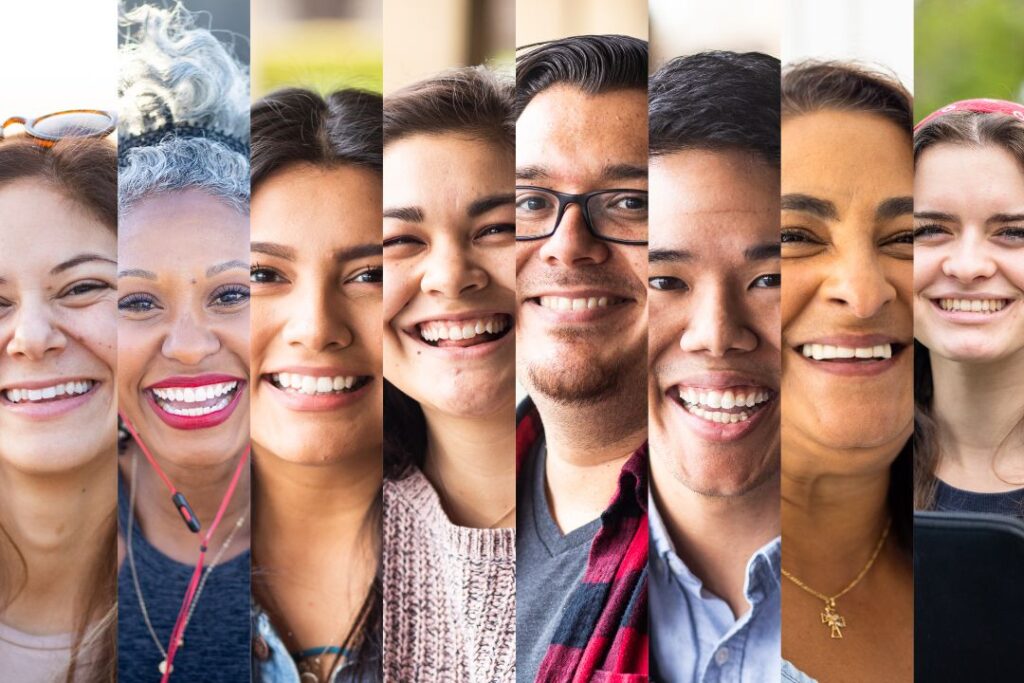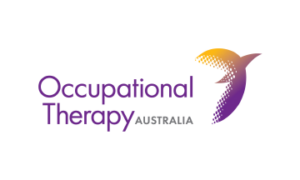Author: Rachel Ottley, Clinic Manager & Paediatric Occupational Therapist
4 Min Read
Have you ever struggled to recognise a familiar face, even someone you see regularly? For many autistic individuals, this is a daily reality. Prosopagnosia, or face blindness, affects the brain’s ability to recognise faces, even those of friends, family, or colleagues. As an autistic adult with prosopagnosia, I’ve had to find strategies to navigate social interactions.
When I started working at MoveAbout, one simple but incredibly effective support was introduced: name tags. This small adjustment made it so much easier for me to get to know people. Another helpful strategy has been updating Zoom labels to show the actual name of the person speaking, rather than a generic account name. These accommodations, along with other neurodiversity-supportive measures at MoveAbout, have helped create a more inclusive and accessible work environment.
What Is Prosopagnosia?
Prosopagnosia is a neurological condition that makes it difficult or impossible to recognise faces. It exists on a spectrum, some people may only struggle with unfamiliar faces, while others may not even recognise their own reflection. This can make social interactions challenging, especially when facial recognition is assumed to be automatic.
For autistic individuals, prosopagnosia adds another layer of difficulty to an already complex social landscape. Many of us rely on logical patterns and contextual clues to navigate interactions. When faces don’t register as familiar, socialising can feel unpredictable and exhausting.

The Connection Between Autism and Prosopagnosia
Research suggests that prosopagnosia is more common in the autistic population than in neurotypical individuals. While not all autistic people experience face blindness, many report difficulty recognising faces, remembering names, or interpreting facial expressions. This can lead to misunderstandings, social anxiety, and even avoidance of certain situations.
Since autism already involves differences in social communication, prosopagnosia can make interactions even more challenging. People may assume we’re uninterested or unfriendly when, in reality, we’re simply struggling to identify them. It’s not about a lack of effort, it’s about how our brains process information.
My Experience with Prosopagnosia at Work
For as long as I can remember, I’ve struggled to recognise faces. If someone changed their hairstyle, put on glasses, or even wore a different outfit, I would often have no idea who they were. I learned to rely on other clues, voice, body language, or unique accessories but, these weren’t always reliable.
When I started working at MoveAbout, I was concerned about how I’d remember who was who. Meeting new colleagues is always a challenge for me because faces don’t stick in my memory the way they do for others. Fortunately, MoveAbout is an incredibly accommodating workplace. To support me, name tags were introduced, allowing me to identify people quickly without the stress of trying to memorise faces. This simple adjustment made it much easier to settle into my new role and build connections with my colleagues.
Another helpful change was on Zoom. Instead of using generic account names, we now update the Zoom label to display the actual name of the person speaking. This makes virtual meetings far more accessible for me, as I don’t have to rely on facial recognition alone to follow the conversation.
How Small Changes Make a Big Difference
These accommodations may seem minor, but they have had a huge impact on my ability to engage confidently at work. Name tags and Zoom labels remove the pressure of facial recognition, allowing me to focus on the interaction itself rather than worrying about whether I’ve misidentified someone.
MoveAbout has implemented several neurodiversity-supportive measures, fostering an environment where differences are acknowledged and accommodated. These adjustments don’t just benefit me, they contribute to a more inclusive workplace where everyone can thrive.

Supporting Autistic Individuals with Prosopagnosia
If you or someone you know experiences prosopagnosia, here are some ways to offer support:
- Use name tags in workplaces, schools, or events to reduce the stress of facial recognition.
- Update Zoom labels to display the actual names of participants instead of generic account names.
- Be patient if someone doesn’t immediately recognise you, reintroducing yourself can be very helpful.
- Offer alternative cues like reminding someone where you last met or mentioning shared experiences.
- Understand that face blindness is real and not a sign of disinterest or rudeness.
By making small adjustments, we can create environments where people with prosopagnosia feel more comfortable and included.
Final Thoughts
Prosopagnosia is a challenging but often overlooked experience, especially within the autistic community. Simple supports, like name tags and Zoom label changes, can make a world of difference in reducing anxiety and improving social connections.
I’m grateful to work at MoveAbout, where neurodiversity is recognised and actively supported. When workplaces embrace accessibility and inclusion, everyone benefits.
Do you experience prosopagnosia, or know someone who does? What strategies have helped? Let’s keep the conversation going!
Contact MoveAbout today. Check out our Facebook and Instagram pages for more education regarding sensory processing and regulation.


